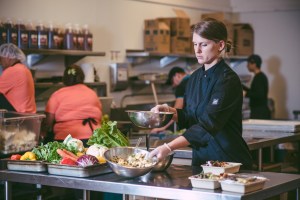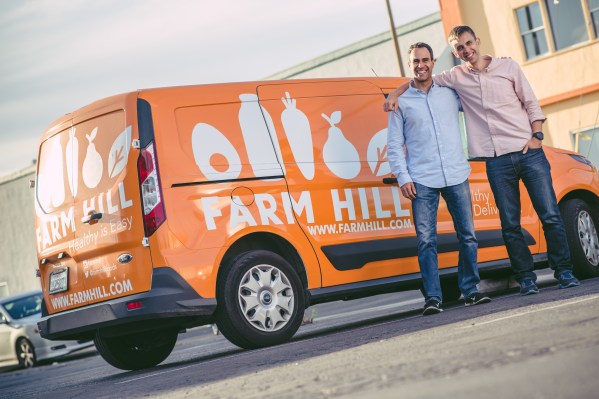A food delivery startup called Farm Hill is expanding its business from the suburbs of Silicon Valley to San Francisco this week, bucking the trend of so many “on-demand” businesses that focus on dense, urban markets first.
Interestingly, Farm Hill benefitted from the demise of one of its city-focused peers in the industry, Spoonrocket. Farm Hill has taken over leases and purchased equipment from Spoonrocket to support its expansion into San Francisco, TechCrunch has learned.
The company also raised another $3 million in funding to support its growth, according to co-founder and co-CEO Marc Manara, brining its total capital raised to $4 million.
Farm Hill’s backers include: StartX, the Stanford affiliated accelerator and fund, Eagle Cliff Partners, SOMA Capital, Liberty City Ventures and the founder of the Fresh Diet, angel investor Zalmi Duchman, along with other individual backers.
Incorporated as Marck Corp., Farm Hill provides lunches made from whole ingredients to people at work who order them individually, or to teams who link their corporate accounts. The lowest-priced meals Farm Hill offers cost $10.
The company promises its meals will contain absolutely no refined grains, added sugars, or other processed foods or flavorings.
The promise of fresh fruit and vegetables, whole grains and sustainably raised meats and fish appeals to dieters of every type from Paleo followers to those watching their carbs to vegans and vegetarians, Manara said.
“There’s only so much value in convenience if the food that gets to you is not really good, and is not super tasty,” Manara said. “That’s why we’ve been so focused on the quality of the food and even have developed signature dishes.” The company’s executive chef, Thea Vengrin, trained at the Culinary Institute of America, kind of the MIT or Stanford for chefs.
Farm Hill’s menu regularly includes: sushi rolls, or a kale salad that can be made into an entree with a choice of lemon herb chicken or sesame tofu, and the company’s popular lemon vinaigrette dressing.

Farm Hill Executive Chef Thea Vengrin.
The company is also focused on keeping the cost of delivery low. It essentially gives a lower rate to teams that order together to have their lunches delivered to the office at the same time.
Each meal always comes chilled and individually wrapped with Farm Hill, unlike health-minded corporate catering services like Zesty, which prepares hot foods for office teams and serves them buffet-style on site.
But batching up the orders and optimizing delivery routes allows Farm Hill to generate better margins than, well, Spoonrocket or competitors like Sprig or Square-owned Caviar, which both deliver to the individual customer.
Farm Hill’s most direct competitor is probably EAT Club. With both services, a company can sign up, and let its employees log in and choose their meal for the day, getting all the individual meals delivered together later that day.
But EAT Club sells hot and cold foods from local restaurants, whereas Farm Hill makes and distributes all of its own meals. And EAT Club’s food isn’t particularly nutrition focused, while Farm Hill has committed to whole ingredients and zero added sugar.
Based in Redwood City, with a new distribution center in San Francisco, Farm Hill employs 50 full-time today, with 15 in corporate and 35 in culinary roles, and an additional 100 drivers who work for the company on a W-2 or part-time basis.
The startup intends to use its funding to add new hires as needed, Manara said, to expand geographically, and to experiment with different technologies that can make its delivery and possibly even its kitchen operations more efficient, whether that’s new business software, robots, or self-driving food carts and delivery drones.
